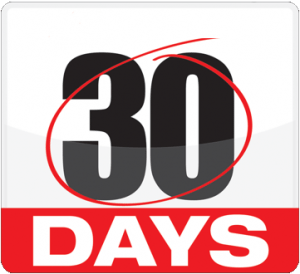Thinking it’s time to upgrade to a bigger or better home?
We know that buying and selling at the same time is daunting…there’s so much to consider. That’s why we put together this comprehensive guide to give you the information and tools you need to navigate the process confidently.
Most home upgraders fall into one (or more) of the following categories. They want to:
- Move to a bigger home
- Move to a home with better finishes
- Move to a different style of home (eg condo to a house)
- Move to a home in a better neighbourhood
- Do any combination of the above
Bigger, better or both?
Scroll down to read our advice for upgraders and upsizers, or quickly jump to any section using the menu.
Needs and Wants
Clearly defining your needs and wants is one of the most important steps in upsizing your home. Here are some questions to ask yourself:
How big of a move-up should I make?
Selling and buying can quickly get expensive, with land transfer taxes, legal fees, real estate commissions, moving costs, utility set-up costs and more. If you’re going to make a move, make it count. If you need more space but don’t have much more budget, consider a neighbourhood change. Lateral moves are expensive.
Read: Should You Buy Your Second Home First?
How has my life changed, and how do I expect it will change?
Do you plan on being in your new home 3, 5, 10 or 20 years? Depending on your age and family situation, you’ll likely need to think about things you didn’t have to consider the last time you bought a home. Do you need to be near daycare or schools (elementary and secondary)? Should you consider getting a house with a second apartment for a nanny or housing aging parents? Are you a dog owner now and need to be near leash-free parks?
What do I love about my current neighbourhood? How do I wish it was different?
Everyone eventually has to make compromises, even when upgrading to a more expensive home. Do you love being able to walk to coffee shops and restaurants? Or do you long for green space and want to live closer to parks and trails?
Read: Guide to Choosing Your Next Neighbourhood
What do I love (and hate) most about my current home?
You know what they say about the devil you know vs. the devil you don’t. Do you love your current kitchen storage? Dream of closets? Do you hate shovelling your current driveway and want to live close to work so you can live car-free? Has your ensuite bathroom saved your marriage?
How much house do I need?
One of the top reasons people want to move is to have more space….but how much space do you really need and where do you need it? If your family is growing, you probably need more bedrooms, possibly another bathroom, and a playroom. Alternatively, you might be looking for more or different space – a home office to house your business, a bigger entertaining area, etc.
What kind of homeowner am I?
It’s time to be honest with yourself: Have you maintained your current home or have you closed your eyes in the hopes that the water in the basement, leaky tap, or squirrels in the attic would go away? It’s OK if you don’t like the work that comes with owning a house—buying a condo, new (or newly renovated) house, or townhouse might be a better option for you. If you hate gardening, why buy another home with a big yard?
Money, money, money
How much more can you comfortably afford to spend without giving up your life? Your primary residence is one of the smartest investments you can make because your equity grows tax-free. But don’t forget that the new more expensive house will come with higher taxes and utility bills too.
What must I do now to be ready to sell my current home?
We’ve had more than a few move-up Buyers fall in love with their new home out of the blue. If you start to prepare your current home now, you can take advantage of those opportunities.
Read: 30 Days to Preparing Your Home for Sale and Are You Ready to Sell?
Should I suck it up and wait?
Sometimes, the right decision is to wait. If you’ll be draining the equity in your current home or straining yourself financially to afford a new house, you might want to wait. One of our favourite strategies (and one we have used ourselves) is to estimate how much extra your new mortgage will be and to start saving that extra money now so you’ll be used to the higher payments when you make a move. Bonus manoeuvre: put that extra cash on your current mortgage and build more equity.
Should You Buy or Sell First?
Should you buy or sell first? The answer depends on:
- The demand for the type of home you currently live in and your neighbourhood.
- The demand for the type of home and neighbourhood you want to move to.
- The state of the real estate market – inventory of homes for sale, interest rates, competition, etc.
- Your financial flexibility and ability to pivot if things don’t go according to plan
- Your personal goals and risk tolerance
While you should always speak to your REALTOR and lender about your specific situation, in general, you want to do the hardest thing first:
- If the market is hot and getting hotter, buy first.
- If the market is cool and getting cooler, sell first.
- If you’re more concerned with buying the right new home than selling your current home for the maximum amount of money, buy first.
- If maximizing the sale of your current home is your #1 priority, sell first.
Your lender and REALTOR can help you decide whether to buy or sell first.
Choosing the Right REALTOR
When you’re upsizing your home, you’ll be buying and selling at the same time, so the REALTOR you hire to help you make the move is an important decision. Here are our top considerations for hiring the best real estate agent if you’re upgrading or upsizing your home:
1. Seek the Right Real Estate Experience and Expertise
If you’re upsizing your home, you’ll need an agent with demonstrated experience in:
- Representing Buyers AND Sellers – Some agents work mostly with Buyers, some work mostly with Sellers, and others work with both. If you’re buying AND selling, hire an agent with a track record helping BOTH. They’ll know how to anticipate and deal with the issues that will inevitably come up.
- Selling or buying the kinds of properties relevant to your upgrade – If you’re selling a condo and buying a house, hire someone with plenty of experience selling both types of properties. Don’t hire a condo expert to help you sell a house, and don’t hire a house expert to help you buy a condo.
Despite the fact that REALTORS help both Buyers and Sellers, there are actually unique skill sets required for each transaction, so when you’re hiring an agent to help you upgrade, you’ll need to assess their skills and expertise on both the buy and the sell sides.
On the buy side, the top skills to look for are:
- Neighbourhood expertise
- Technical knowledge about condos and/or houses
- Offer and negotiation strategy
Selling skills to look for:
- Staging expertise (or in-house stagers)
- Marketing skills (digital and traditional)
- Pricing strategy and negotiation
2. Hire an Agent with Experience Helping Upgraders and Upsizers
Upsizing your home comes with unique challenges as you buy and sell at the same time, so you’ll want to hire an agent who is:
- Well-versed in helping upgraders make decisions related to financing, timing (should you buy or sell first?) and closing (should the properties close on the same day?).
- Able to mobilize quickly. Things move fast in real estate, and even more so when you’re buying and selling at the same time. If you buy first, your agent will need to rally to get your home listed quickly; likewise, if you sell first, you’ll want someone who can prioritize your now-urgent search for a new home. Many upgraders choose to hire real estate teams (like us!) that are able to make things happen more quickly.
- Able to help you understand the costs of upgrading and provide strategies to help you reduce the costs
- Able to problem-solve—Buying and selling simultaneously isn’t easy, and it’s important to have a Plan B (and even a Plan C or D) if things don’t go as planned.
3. Reputation Matters
While many REALTORS focus on the sales awards they’ve received, past client satisfaction is a more important measure of performance and what you can expect. Read online reviews on Google, Facebook, Real Satisfied and Yelp, looking for trends in what an agent’s past Buyers and Sellers are saying. There’s nothing wrong with asking an agent for references so you can speak directly with past clients.
4. Hire For the Soft Skills That Matter to You
We’re often brought in to help upsizers after they’ve had a bad experience with another agent. The complaints we hear the most often usually revolve around:
- Communication
- Responsiveness
- Listening
- Availability
- Trustworthiness
While the agent’s soft skills that matter will depend on your own personal preferences and situation, it’s an important consideration when hiring an agent.
5. If You Have to Work With Two Agents…
While it’s ideal to hire ONE agent to help you sell your current home and buy your next home, you might need to hire two agents, for example, if you’re selling in Toronto and buying outside of the city. If you have to hire two agents to help with your upgrade, keep the following in mind:
- Once you’ve picked one of the agents, check if they have a partner they trust to help with the second transaction.
- Communication between the two agents is critical. To help facilitate a smooth process, the agents will need to update each other about financing issues regularly, the status of the home search or listing, closing dates and timing.
- Hiring two agents with similar styles will help with your sanity too.
6. Should You Hire Your Last Agent?
While it might be tempting to simply call the agent who helped you buy the home you’re currently in, it’s important to step back and make sure they are the right agent to help with your current real estate upgrade needs. While your last agent might have been great at helping you when you were a first-time Buyer, they might not have the experience to help you sell that home for top dollar.
Costs to Buy & Sell
Upsizing or upgrading your home is expensive. Here are the costs you should be ready for:
Costs to Buy a Home
- Home Inspection ($400-$600) or condo status certificate ($100)
- Appraisal or Mortgage Broker Fees
- CMHC Mortgage Default Insurance (if less than 20% downpayment)
- Title Insurance (approx $250)
- Land Transfer Tax (variable)
- Legal Fees + HST ($1,500+)
- Adjustments for pre-paid condo fees/taxes/utilities paid by the Seller
- Utility set-up fees
- Moving Costs
Costs to Sell
- Home Prep and Cleaning
- Staging
- Pre-listing home inspection or condo status certificate
- Babysitting and Pet Boarding
- Mortgage Penalty (if unable to port your mortgage)
- Bridge financing costs (if your closing dates don’t coincide)
- Real estate commission + HST
- Legal Fees + HST ($1,500+)
Costs of Timing Decisions
The decision to buy or sell first may give rise to unexpected costs. Make sure you consider:
- Bridge financing costs – If you aren’t able to perfectly align the closing dates of the sale of your current home and purchase of your new home, you may be on the hook for bridge financing costs, which cover the bank’s costs of lending you money until your current home closes.
- Changes in interest rates – If you decide to sell first, interest rates may increase before you’re ready to buy. To avoid surprises, lock in an interest rate with your lender and renew your pre-approval every 90 days. If interest rates go down, you’ll still be eligible for the lower rates.
- A lower sale price than expected—If you buy first, what happens if your home doesn’t sell for the price you expect or need? It’s always a good idea to underestimate the value of your current home when planning your budget. A buyer’s offer is the only guarantee of a home’s worth.
- Fluctuations in the real estate market – In an ideal world, everyone would sell when the market is hot and buy when it’s not, but you’re just as likely to buy high and sell low. Be ready for market volatility, and have a Plan B.
The Ongoing Costs of Your Upgraded Home
You’ll almost certainly be looking at higher ongoing costs:
- Home Price: Chances are, the price of your next home is more than your current one, and a higher price tag comes with bigger mortgage payments and higher property taxes.
- Upgrading for size? Be ready to spend more money on utility bills, repairs, cleaning, snow removal, gardening and furnishings.
- Renovations: Make sure to budget for all repairs and renovations – not just the new shiny kitchen or bathroom. At some point, every homeowner spends unsexy money, whether putting in new drains, a new roof or replacing the furnace – and almost every Buyer has at least one unplanned surprise expense to contend with at their new home.
- The Condo to House Upgrade: If you’re moving from a condo to a house, you’ll need to budget for garbage, water, higher home insurance premiums and utilities (if they weren’t included in your condo fees). While you might be excited to stop paying condo fees, owning a house is almost always more expensive than the ongoing costs of a condo.
Strategies to Reduce Upsizing Costs
If you’re looking to reduce the expenses of your big upsize, consider the following tips:
- Focus on Your Sale While most upgraders focus on the Buy more than the Sell, it’s important to squeeze every last dollar out of the home you’re selling. That means investing time (and probably some money) in preparing and repairing your home, professional cleaning, and staging. You’ll want to make sure you hire a top REALTOR, too, who’ll guide you on price and negotiation strategy, market your home to as many potential Buyers as possible, and help with staging.
- Shop for Mortgage Rates Make sure to talk to a few different lenders to see the various mortgage products and interest rates available to you. It might be worth paying a penalty to break your current mortgage if it means you’ll benefit from years of lower interest rates and lower payments.
- Change Neighbourhood If you need more space but don’t have much extra budget, consider moving to a different neighbourhood where prices are lower. That might mean being further away from downtown, moving to a transitioning neighbourhood or moving to the ‘burbs.
- Have a Plan B Sometimes, when you buy and sell simultaneously, things don’t go as planned; be ready for the unexpected.
Upsizing with BREL
Here are a few of the reasons to consider upsizing with the BREL team:
- We’ve helped a LOT of upsizers – our expertise has been honed by facilitating over 2000 transactions and over $1 billion in real estate sales. Most of our clients are upsizers.
- Our reputation precedes us – we have 750+ 5-star reviews ⭐️⭐️⭐️⭐️⭐️ (you can read them here)
- Our results speak for themselves. In 2023, BREL listings sold more than twice as fast, and for an average of $10,969 more than the average home listed on the TRREB MLS.
- Nobody markets a property like BREL – Digital marketing isn’t new for us; it’s been at our core since day one. You’ll find us on Facebook, Instagram and TikTok – and more than 75,000 people visit our website monthly.
- Have you seen our staging? Our competitors regularly try to hire us to stage their listings – but our in-house designers, stagers and warehouse full of furniture and accessories are exclusive to BREL clients.
- All-inclusive commission – We’re transparent about our commission and pay for professional cleaning, staging, status certificates and more.
- We’re responsive and available. We pride ourselves on being easy to reach and quick to respond. We know that buying and selling simultaneously can be stressful, and we’re here to answer your questions and provide guidance whenever you need it.
- Pricing and negotiation – We’re really, really good at this. Every BREL agent is a Certified Negotiation Expert.
- Bespoke service – No two upsizers are alike, so we tailor our services to meet your unique needs.
- No BS – It’s not just part of our slogan – we pride ourselves on being upfront and honest with our clients.












